Lauren Steussy,Nora Naughton
Thu, February 1, 2024
The world's largest EV maker BYD is getting into the shipping business.
The company has purchased its first vessel to ship cars around the world.
The BYD Explorer No.1 set sail on its maiden voyage this month with 5,000 BYD cars.
BYD, the world's biggest electric vehicle maker, isn't just hitting roads in a major way — it's hitting the open seas.
The Chinese company and Tesla rival set sail in January with 5,000 cars on its first vehicle carrier, named "BYD Explorer No.1."
The new ship represents a major milestone for BYD because it'll help the company meet the growing global demand for its electric cars by reducing the cost of getting them out to the masses.
China only has access to a small sliver — 2.8% — of domestic car-carrier vessels, according to the MIT Technology Review. Car giants like Japan's Toyota have whole fleets in place already to transport their cars around the world.
BYD's new roll-on, roll-off (RORO) carrier is now headed for India after making stops in the Netherlands and Germany, according to Reuters.
The company said in a press release it plans to add seven more vessels to its fleet in the next two years.
BYD sold about 3 million cars in 2023. Though a majority of the vehicles were sold to Chinese buyers, the company exported about 243,000 cars to countries including Australia, Brazil, and Israel, according to Reuters, citing the China Passenger Car Association.
Those limited exports were still enough to surpass Tesla for the first time in the fourth quarter. While EV demand in key regions like Europe and the US has waned significantly in the past several months, auto industry experts say much of this softening in demand has more to do with an affordability issue for electric cars and customers adjusting to a more brutal economic environment.
This could usher in the next stage of a long-awaited Chinese takeover of the electric vehicle market, with BYD's more affordable models situated well to meet US demand in particular.
EV demand hasn't dried up in the US so much as it has changed in the past year, with customers prioritizing price and practicality over style and performance. That leaves a perfect opening for BYD, particularly if lower shipping costs allow the company to keep sticker prices low.
A German dealership is launching a BYD-only showroom in Berlin, as Tesla killer tries to make its presence in Europe known
Ryan Hogg
Thu, February 1, 2024
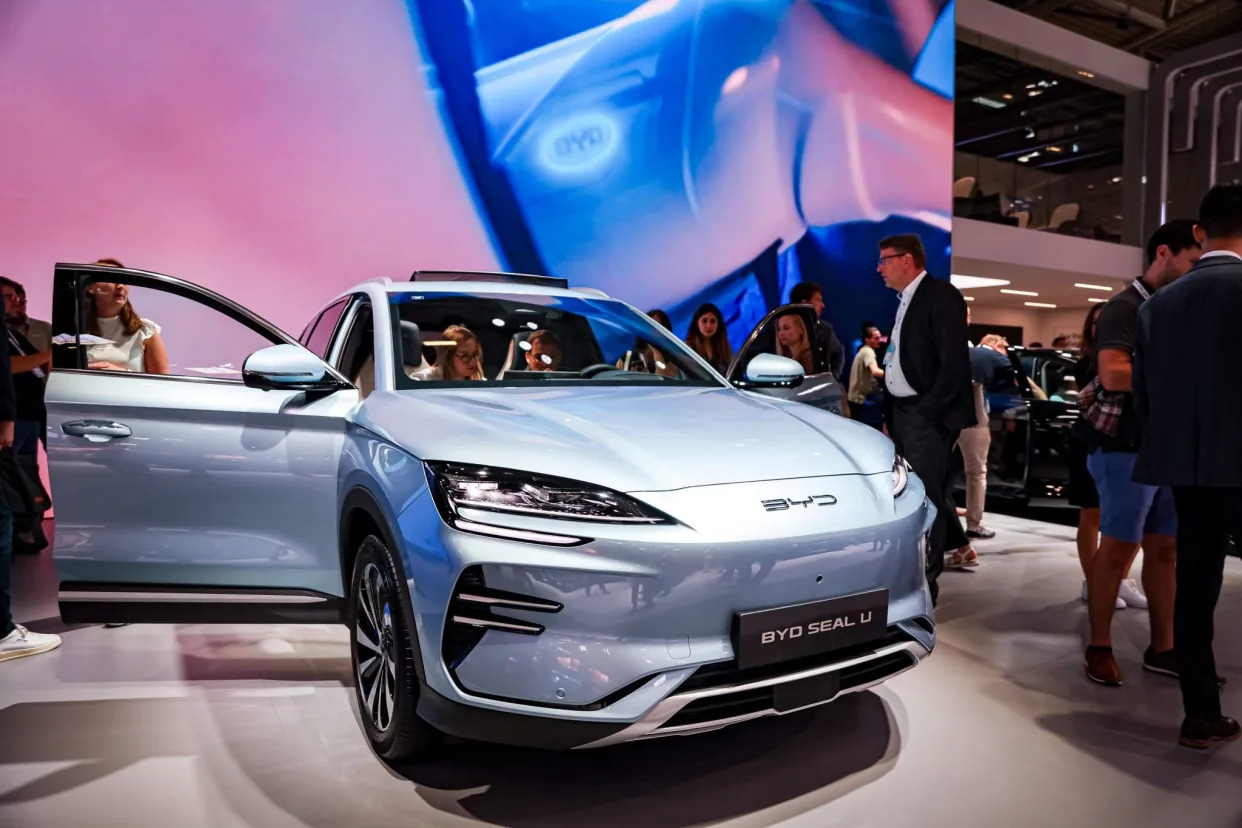
BYD is sounding the drum on its march into Europe. So far, the main result of those war cries has been to leave legacy carmakers in a “state of shock” at the Warren Buffett-backed group’s ultra-low prices.
Now manufacturers and curious customers in Europe will get a fresh opportunity to view the competition up close.
German dealership Stern Auto will launch a BYD-only dealership in Berlin, Reuters reports.
Stern Auto, which has exclusive rights to sell BYD in east Germany, plans to showcase the group’s five models at the store as it aims to foster brand recognition in a market that has long favored local manufacturers.
BYD, which still makes the vast majority of its sales in China, passed Tesla for EV sales in the fourth quarter of 2024. It also beat German giant Volkswagen to become the biggest automaker in China in 2023.
The group is now looking west as part of its ambitious plans to shift more units of its cars amid an ongoing price war with Tesla and other automakers.
In October, BYD announced its distribution partners for the German market, which will see the group’s cars don showrooms in cities including Berlin, Munich, Hamburg, and Frankfurt.
The group’s newly announced factory in Hungary is expected to start churning out cars in the next three years in a bid to avoid steep import tariffs. In the meantime, it has also earmarked special cargo ships to transport EVs from to Europe. The first ship carrying 7,000 cars set sail in January.
However, the carmaker will face several challenges as a new market entrant to Europe.
BYD fighting for brand recognition
Beyond potential connectivity issues and the prospect of higher labor costs outside its native China, a major obstacle to conquering Europe highlighted by analysts has been the often unshakeable brand loyalty of drivers who have grown up with Volkswagen, Renault, or Mercedes-Benz on their driveways.
A September study by Bloomberg Intelligence found three out of five European drivers expected to stick with their current brand; only 17% expected to switch to a new automaker.
“I do believe that the credibility and trust that European brands enjoy will help them defend their inventory against new entrants," Fabian Brandt, head of automotive and industrial goods at management consultancy Oliver Wyman, told Fortune last week.
“It’s also very much about local presence and local trusts and dealerships, and all that is relatively hard to build.”
BYD has sought to narrow a brand recognition gap by doubling down on marketing and advertising to familiarize Europeans with its growing presence on the continent.
"One of the biggest topics for BYD is that it is not that familiar to German customers," Oliver Hein, head of BYD for Stern Auto, told Reuters. However, he told the publication that recognition was growing “exponentially” thanks to the group’s increased marketing.
Beyond convincing Germans and other Europeans to buy its cars, BYD also faces regulatory headaches.
The carmaker is the subject of a major EU antitrust investigation into its cut-price cars, with the entry-level Seagull priced at $11,000.
European Commission president Ursula von der Leyen pledged to crack down on carmakers offering cheaper models in Europe thanks to subsidies enacted in their home countries, with BYD the obvious target of this frustration.
This story was originally featured on Fortune.com
Elon Musk Thinks This Warren Buffet-Backed Chinese EV Manufacturer Is Going To 'Demolish Most Other Car Companies'
Caleb Naysmith
Thu, February 1, 2024
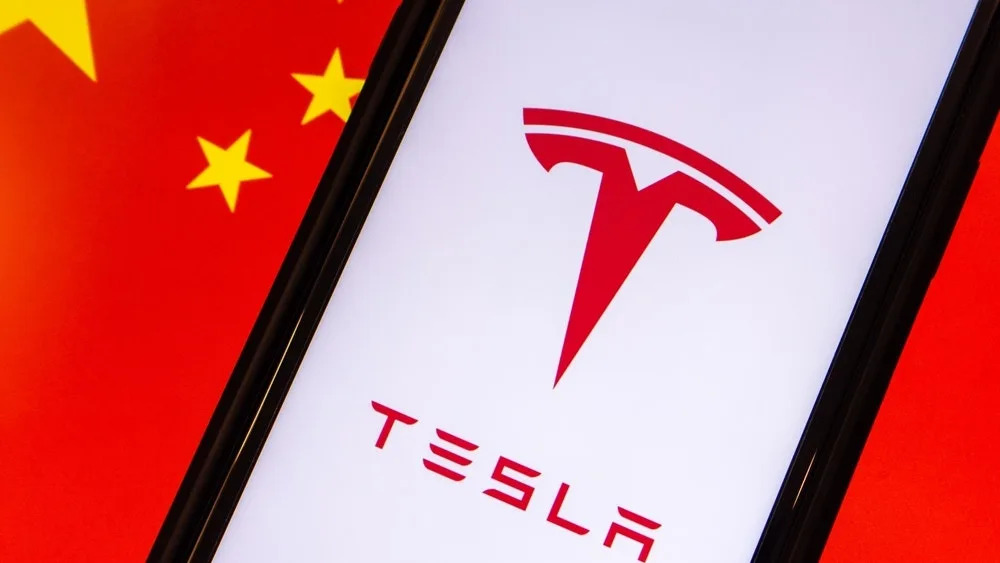
Elon Musk, CEO of Tesla Inc. (NASDAQ:TSLA), quickly changed his perception of BYD Co. Ltd. (OTC:BYDDY), a Warren Buffett-backed Chinese carmaker that has transformed within one year.
During a live Bloomberg interview last year, when Musk was asked about his competitor BYD, he laughed and responded, "Have you seen their car? ... I don’t think they have a great product."
Musk said he wasn’t concerned about BYD as a serious competitor in the electric vehicle (EV) market.
BYD surpassed Tesla in EV sales, delivering 526,409 cars compared to Tesla’s 484,507, according to the companies' fourth-quarter reports.
This unexpected surge prompted Musk to acknowledge BYD’s prowess, saying, “Frankly, if there are not trade barriers established, they will pretty much demolish most other car companies in the world.”
This shift highlights the dynamic nature of the electric car industry and the intense competition among global players.
Trending: Cheddar was acquired for $200 million yielding a return of 370.37% for its investors. This startup aims to replicate and potentially surpass this success.
Musk’s acknowledgment of BYD’s competitive strength and subsequent revelation of Tesla’s decline in EV sales had a tangible impact on the market.
Following Musk’s comments in the earnings report, Tesla’s shares dropped 12%. Tesla also missed earnings and revenue expectations and expects next year "may be notably lower."
This reaction underscores the sensitivity of investors to the evolving landscape of the electric car industry and the significance of recognizing emerging contenders.
© 2024 Benzinga.com. Benzinga does not provide investment advice. All rights reserved.
German dealership Sternauto opens BYD store in Berlin
Wed, January 31, 2024
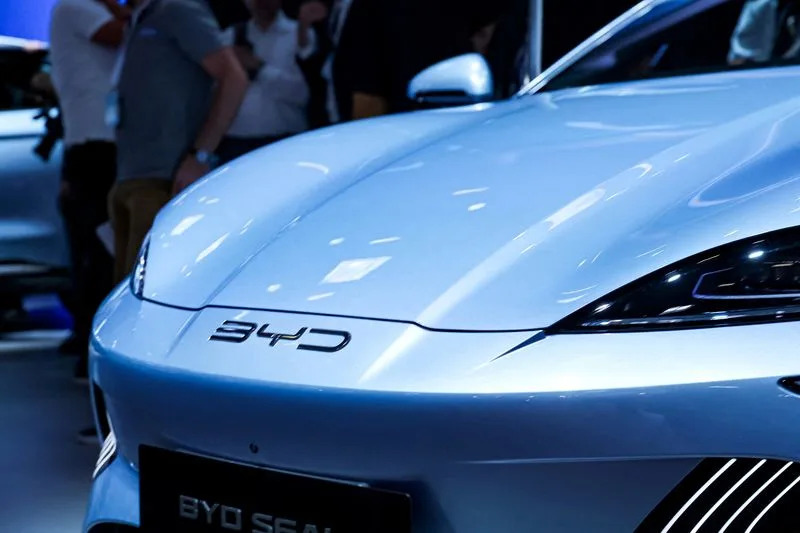
FILE PHOTO: 2023 Munich Auto Show IAA Mobility
By Victoria Waldersee and Annegret Hilse
BERLIN (Reuters) - Chinese EV giant BYD's five models on sale in Germany will be showcased at a new BYD-only store in Berlin run by dealership Sternauto, in the latest sign that the carmaker is rapidly encroaching on European competitors' turf.
Sternauto, which has exclusive rights to sell BYD cars in eastern Germany, set up the store to get closer to customers as awareness of the brand grows among Germans seeking an affordable electric vehicle.
"One of the biggest topics for BYD is that it is not that familiar to German customers," Oliver Hein, head of BYD for Sternauto, told Reuters. But recognition is growing "exponentially" as the brand invests heavily in marketing, he added.
While most of BYD's revenues still stem from sales in China, the carmaker has set its sights overseas with new manufacturing capacity under construction in Hungary, Brazil, and Thailand.
It sold more EVs than Tesla in the fourth quarter of last year and is growing at a fierce speed, with 2023 net profit expected some 86.5% above 2022's.
Already, it is coming under scrutiny from European officials investigating whether carmakers exporting China-made EVs to Europe have an unfair advantage over domestic players, in a sign of the looming regulatory battle between Europe and China as Europe attempts to shield its market from low-cost competition.
While Chinese brands can sell their vehicles in Europe at higher prices than in China and still undercut local pricing, they also face challenges from supply chain bottlenecks to import costs and complex certification requirements.
"There's going to be a major shakeout of Chinese brands in the next 5-10 years," Hein said. "If someone runs out of steam, they'll be out of the market relatively fast," he said, adding Sternauto felt BYD had what it takes to succeed.
(Reporting by Victoria Waldersee; Editing by Mark Potter)
Wed, January 31, 2024

FILE PHOTO: 2023 Munich Auto Show IAA Mobility
By Victoria Waldersee and Annegret Hilse
BERLIN (Reuters) - Chinese EV giant BYD's five models on sale in Germany will be showcased at a new BYD-only store in Berlin run by dealership Sternauto, in the latest sign that the carmaker is rapidly encroaching on European competitors' turf.
Sternauto, which has exclusive rights to sell BYD cars in eastern Germany, set up the store to get closer to customers as awareness of the brand grows among Germans seeking an affordable electric vehicle.
"One of the biggest topics for BYD is that it is not that familiar to German customers," Oliver Hein, head of BYD for Sternauto, told Reuters. But recognition is growing "exponentially" as the brand invests heavily in marketing, he added.
While most of BYD's revenues still stem from sales in China, the carmaker has set its sights overseas with new manufacturing capacity under construction in Hungary, Brazil, and Thailand.
It sold more EVs than Tesla in the fourth quarter of last year and is growing at a fierce speed, with 2023 net profit expected some 86.5% above 2022's.
Already, it is coming under scrutiny from European officials investigating whether carmakers exporting China-made EVs to Europe have an unfair advantage over domestic players, in a sign of the looming regulatory battle between Europe and China as Europe attempts to shield its market from low-cost competition.
While Chinese brands can sell their vehicles in Europe at higher prices than in China and still undercut local pricing, they also face challenges from supply chain bottlenecks to import costs and complex certification requirements.
"There's going to be a major shakeout of Chinese brands in the next 5-10 years," Hein said. "If someone runs out of steam, they'll be out of the market relatively fast," he said, adding Sternauto felt BYD had what it takes to succeed.
(Reporting by Victoria Waldersee; Editing by Mark Potter)
BYD Seal review: the Chinese contender giving Tesla something to think about
Alex Robbins
Thu, February 1, 2024
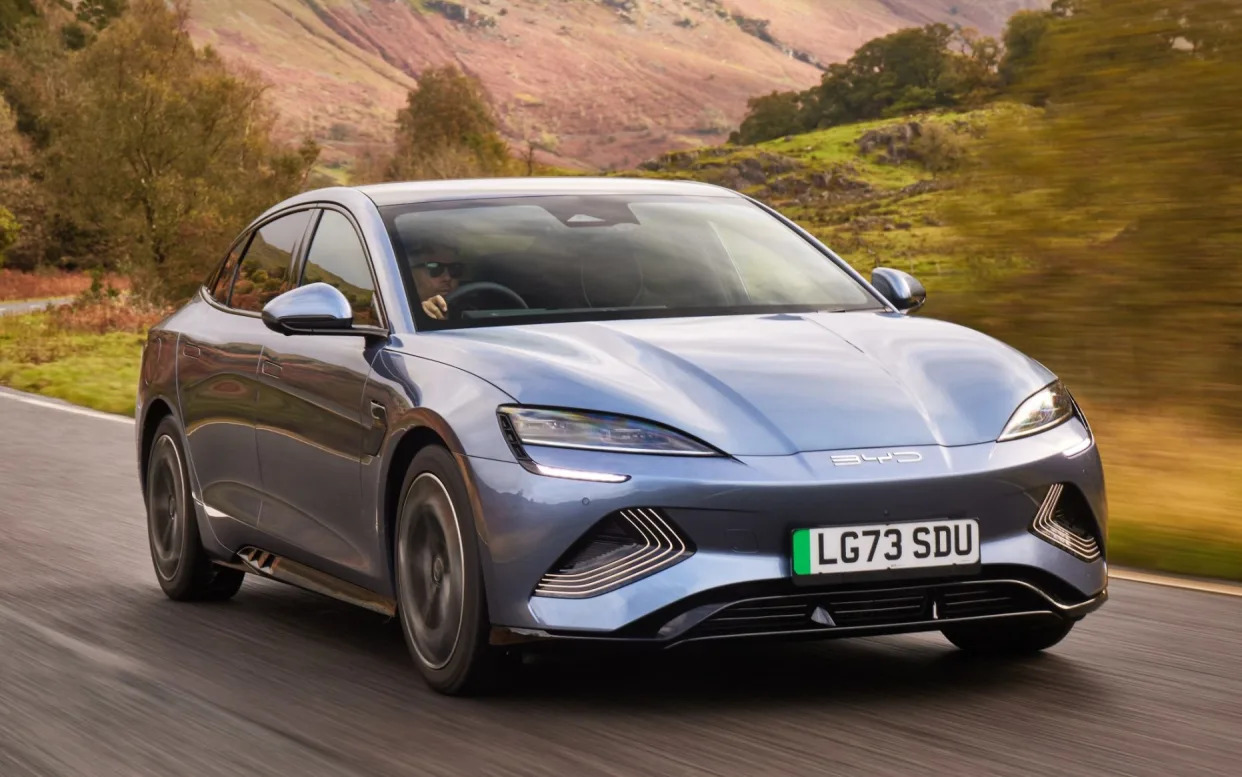
The BYD Seal electric executive saloon - James Arbuckle
“The what?” said my friend, when I said what I was reviewing next. “Never heard of it. Seal? As in, sea lion?” I sighed and nodded, opting to ignore his flagrantly inaccurate conflation of pinniped species. The fact is the BYD Seal does have a bit of an odd name. And that won’t be the only thing that might put off buyers.
Despite this being the third car Chinese manufacturer BYD has decided to bring to the UK, it could hardly claim widespread brand recognition. But where its previous models, the Atto 3 and Dolphin SUVs, are going after value-conscious families, the Seal has a tougher market to crack: user-choosers of executive saloons provided on their company car scheme.
Never has there been a more image-conscious driver, so its name may cause the Seal to stumble at the first hurdle – especially when friends ask what the BYD bit stands for (it’s, ahem, Build Your Dreams). Which is a shame, because behind the slightly dorky badging sits a car of some talent.

The badging may be 'slightly dorky', but the car behind it is impressive - James Arbuckle
Pros
Impressive battery tech
Lots of equipment for the cash
Smooth, slick drive
Cons
Relatively slow charging speeds
Gimmicky touchscreen with fiddly menus
Some quality glitches inside
Seal of approval?
It’s worth delving beneath the Seal’s skin just for a moment, for while this is superficially just another electric executive saloon in the vein of the Tesla Model 3, Hyundai Ioniq 6 and Volkswagen ID.7, there are several key differences.
For one thing, BYD uses a lithium ferro-phosphate (LFP) technology for its battery, which means unlike a lithium ion (Li-ion) battery of the sort you’ll find in most other EVs, there’s no cobalt, thus reducing the amount of precious metals required.
It also means it won’t catch fire and burn for days if it’s holed – as BYD is only too keen to demonstrate by showing us at every opportunity videos of its batteries being poked, prodded and pierced alongside Li-ion batteries subjected to the same treatment.
Traditionally, LFP batteries suffer from lower energy density, which means they take more space to achieve the same range. BYD, however, has come up with long, thin cells it calls blades, which can be used to fill awkward gaps in the car’s platform. As a result, it has managed to fit them into all sorts of nooks and crannies without impinging on interior space.
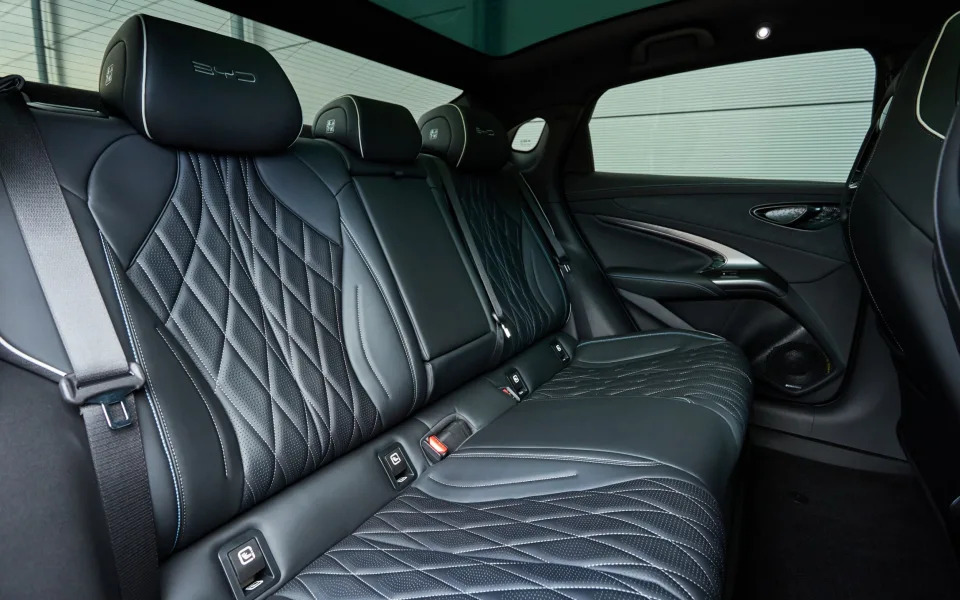
The BYD Seal's clever, compact battery technology means that interior space isn't compromised - James Arbuckle
This means you get 82.5kWh – and unlike a Li-ion battery, all of this is usable, meaning a 354-mile range in the rear-wheel-drive version, which shrinks to 323 miles in the all-wheel-drive model with its extra motor (expect around 260 and 240 real-world miles respectively).
The by-product is that this sort of construction is so strong that the battery can be incorporated into the car’s platform and used as a stressed member, adding stiffness. This results in impressive torsional rigidity and crashworthiness – borne out by some rather impressive results in industry-standard Euro NCAP crash tests.
And this is before we get to the clever space-saving integrated eight-in-one controller, or the standard high-efficiency heat pump. Make no mistake, this is no cheap Chinese knock-off.
Charged with loitering
Charging speeds could be quicker, though – 150kW isn’t bad at first glance, but it’s a big old battery, while its technology means you get fewer miles per kWh than you do elsewhere.
So it takes just shy of 40 minutes to get your Seal from 10 to 80 per cent capacity, and you’ll only have gained 170-odd miles of real-world range in the process; by contrast, a Hyundai Ioniq 6 on a suitably fast charger will take only 16 minutes to add a similar number of miles.
There are only two versions of the Seal; the rear-wheel-drive Design and the four-wheel-drive Excellence. Even the former can crack the 0-62mph sprint in only 5.9sec and has sufficient equipment to make the £45,000 price feel justifiable. The latter costs only £3,000 more, yet will hit 62mph in 3.8sec, which is a price-to-performance ratio not even a Tesla Model 3 can live with.
Inside, you’ll find BYD’s trademark rotating screen is here, allowing you to switch between portrait and landscape modes (as long as you’re not using Apple CarPlay or Android Auto, in which case you’re locked into the former, for now at least).

The rotating screen controls virtually all of the car’s main systems, and is quite hard to navigate - James Arbuckle
It’s rather gimmicky, and enough to make one clutch one’s pearls at the thought of potential repair costs 10 years down the line; what’s more, the software powering it is quite hard to navigate, a drawback made worse by the fact it controls practically every one of the car’s main systems, including the climate control.
So labyrinthine is the set-up, in fact, that turning the heated seats on or off requires no fewer than six prods if you’re to get there from the navigation screen, all of which require you to take your eyes off the road as you can’t feel where on-screen “buttons” are.
BYD’s argument is that it uses a sophisticated voice control system to allow you to do this simply by telling the car – but would it really have been such a burden to give us a row of physical buttons beneath or alongside the screen, instead of making it rotate? It’s a great party trick, but it feels as though it comes at the expense of basic usability.
Plastic fantastic
There are a couple of other odd decisions inside, too, for example the face-level air vents being fixed, so if you don’t like the direction in which they blow, well, tough.
The door handles are made from nasty plastic, too, which feels like a peculiar dropped ball given the rest of the interior materials are tactile and high-quality, with lashings of faux suede swooping across the dashboard, lots of colour-changing ambient lighting and dense plastics. It’s still not quite as high-end as a BMW i4, but against other rivals the Seal can cut it.
Space in the front is good, with huge amounts of storage for odds and ends all over the place. In the back, the seating position won’t suit everyone – your hips are placed quite low relative to your knees, which isn’t entirely natural.

Space in the front is good, with plenty of room for storage - James Arbuckle
There’s plenty of leg and head room, though, so you won’t feel cramped. Boot space, meanwhile, is about par for the course, with 400 litres in the back and an additional 53 under the bonnet – about the same as the Hyundai and Tesla, but less than the VW; the saloon boot lid, however, isn’t quite as practical as the hatchback you’ll find on the BMW.
It’s good, but not great, so far – but in fact the Seal is at its best when you start driving it.
Tracking device
BYD offered us half an hour on a test track, which felt somewhat extraneous in a car like this, but given the rain was biblical during our slot, it did at least prove just how predictable and safe the handling is.
In fact, the all-wheel-drive model was able to show off its astonishing traction – even in these conditions, you can still floor the throttle out of a bend and it’ll somehow get all that power down onto the sodden circuit.
In the real world, the Seal is just as impressive. BYD has obviously spent a lot of time finessing the controls; the accelerator, for example, is progressive and easy to moderate, in contrast to the hair-trigger sharpness of a Tesla’s. The brakes, meanwhile, blend friction and regenerative stopping power seamlessly, while the steering is direct and progressive.

The all-wheel-drive model has astonishing traction, even in the wet - James Arbuckle
The only surprise is that there are no surprises, meaning that despite the lack of feel through the wheel or the chassis you quickly build confidence that the car will go where you point it, so you can flow it satisfyingly through bends. Granted, it lacks the dynamism of the i4, but it’s safe, responsive, agile and well balanced.
There’s a bit of softness to the suspension set-up which means it floats a little over crests, but the payoff for this is that the ride over most roads is cushiony soft – far more so than most of these EV saloons’. The large wheels and narrow-sidewalled tyres generate just a bit of patter over heavily ridged surfaces, but bigger bumps disappear under the wheels with nary a trace and potholes are blotted out remarkably well.
Verdict
In other words, the Seal has more going for it than just the added smugness of going cobalt-free – not to mention knowing your car is less incendiary than other EVs might be – thanks to that innovative battery tech.
Granted, there are some frustrating niggles that prevent it from being a five-star car. However, this is a cogent and well-rounded effort that impresses out on the road, feels pretty smart inside and offers enough range and practicality to mix it with the best.
If I were told it was to be my next company car, I wouldn’t be disappointed. Even if it meant putting up with a few quizzical looks when I told people what it was.
The facts
On test: BYD Seal Excellence AWD
Body style: Four-door saloon
On sale: Now
How much? £48,695 on the road (range from £45,695)
How fast? 112mph, 0-62mph in 3.8sec
How economical? 3.4mpkWh (WLTP Combined)
Electric powertrain: AC asynchronous (front) & permanent magnet synchronous (rear) motors with 82.5kWh LFP battery, 150kW on-board charger, Type 2/CCS charging socket
Electric range: 323 miles (WLTP Combined)
Maximum power/torque: 523bhp/494lb ft
CO2 emissions: 0g/km (tailpipe), 32.1g/km (well-to-wheel)
VED: £0
Warranty: Six years/93,000 miles
Spare wheel as standard: No (not available)
The rivals
Tesla Model 3 Long Range
346bhp, 390 miles, £49,990 on the road
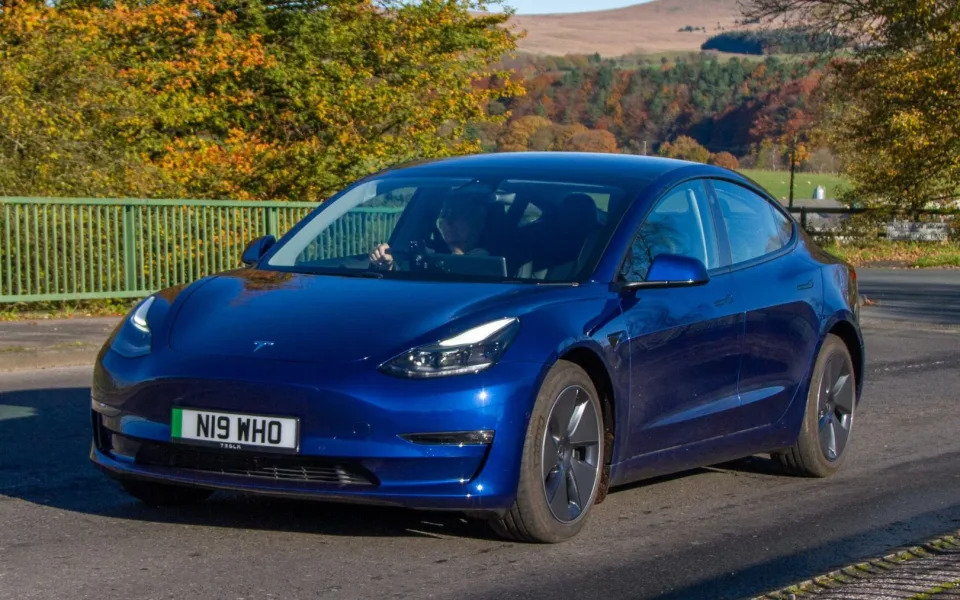
Tesla Model 3 Long Range - ZarkePix/Alamy
The Model 3 is a touch more expensive, but it’ll go further on a charge and be faster to pump volts into when you do need to stop. Its minimalist interior is less busy and less gimmicky than the BYD’s swoopy affair, though the wheel-mounted, button-operated indicator switches feel like a bridge too far. And while the Model 3 is roomier inside, it can’t match the BYD’s ride comfort, nor its gentle, progressive control weights.
Hyundai Ioniq 6 AWD Ultimate
321bhp, 322 miles, £50,540 on the road
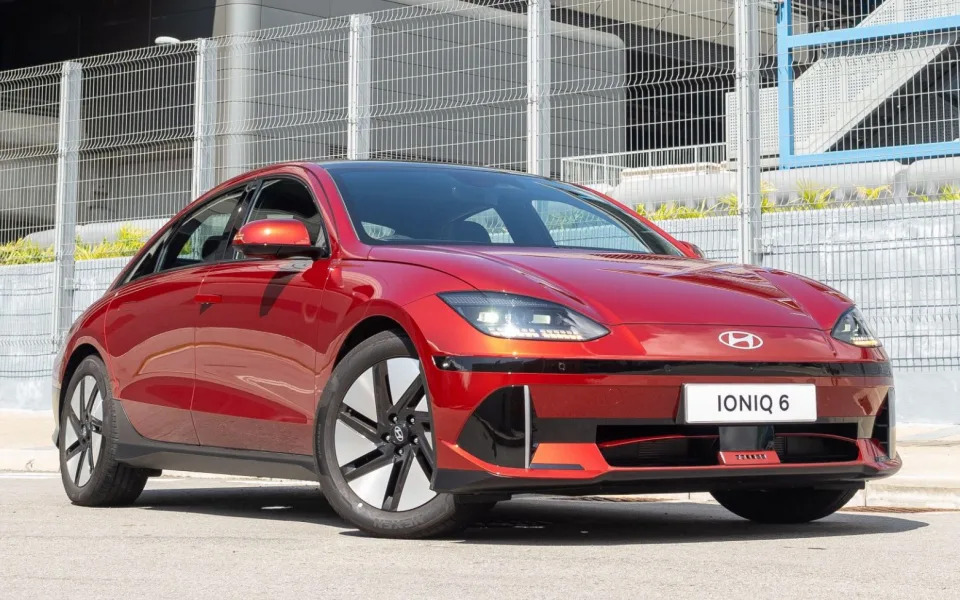
Hyundai Ioniq 6 - Wing Lun Leung/Alamy
Hyundai’s fancy streamliner is certainly eye-catching and is both a lovely place to be and a delight to drive. It also has the fastest available charging speeds here, on the proviso you can find a charging point to match. And you get a smart interior with a slicker touchscreen than the BYD’s. All good news, then – but the Ioniq 6 costs a couple of grand more.
BMW i4 eDrive35 Sport
282bhp, 293 miles, £49,995 on the road

BMW i4 - CJM Photography/Alamy
BMW brings you less for more, it seems. Less range, less power – and of course you have to get past that challenging front end, too. Having said that, there are intangibles that might make the i4 worthwhile – namely, the higher-quality interior, the more versatile hatchback boot and the fabulous ride and handling balance; indeed, if you want an EV that you can have a bit of fun in, this is the one to have.
No comments:
Post a Comment